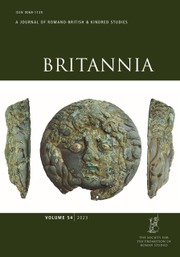Article contents
Chronological Errors in Dio's Account of the Claudian Invasion
Published online by Cambridge University Press: 09 November 2011
Extract
The Roman invasion of Britain in A.D. 43 was an event of great importance both for the future history of the island and for the emperor Claudius' attempt to establish for himself a reputation as a great military commander, and it is unfortunate that there is not more reliable information on the campaign. The chapters of Tacitus' Annals that covered the years A.D. 37–47 are missing, and the summary of events in Britain in the Agricola says very little about the invasion. Suetonius' review of the campaign (Claud. 17) is very brief and (to Claudius) extremely hostile. Accordingly, so far as literary evidence is concerned, we must rely almost entirely on the account provided by Dio (60. 19–24). His description of the campaign seems relatively straightforward, but there are places where modern historians have felt inclined to treat his judgement with caution. For example, his apparent acceptance at face value of the arrangement that Claudius would come to the aid of Plautius in the event of a genuine emergency seems naïve. However, the possible weaknesses of Dio's judgement on this and similar points are not too difficult to discern; it is in points of detail that his errors have, in fact, been most misleading, and it might be useful to draw attention to two chronological errors in his account of the invasion that have escaped comment.
- Type
- Articles
- Information
- Copyright
- Copyright © Anthony A. Barrett 1980. Exclusive Licence to Publish: The Society for the Promotion of Roman Studies
References
1 CIL 14.2241 (=CIL 6. 2015).
2 Capitolil cellam ipsam intravit Sexto Palpellio Histro L. Pedanio coss., propter quod nonis Mantüs urbs lustrata est eo anno.
3 Suetonius does not include the consulship held by Claudius before he became emperor (in A.D. 37). Dio can hardly have confused Claudius' consulship of A.D. 43 with his last (in A.D. 51), since Suetonius seems to have been in error in stating that the last was for only six months. A gladiatorial tessera has survived (Dessau2 5161g) with an inscription showing that in A.D. 51 Claudius was still consul on 27 September, with L. Calventius Vetus Carminius.
4 Vegetius, De Re Mil, 4. 39, tells us that the best sailing season is between 27 May and 14 September, and that between 10 November to 10 March the seas are closed to shipping (maria clauduntur). There are several instances where this prohibition on winter travel was ignored, especially at times of military crisis (listed by Saint-Denis, E. de, Rev. Ét. Lat. xxv (1947), 196–215Google Scholar, and Rougé, J., Rev. Ét. Anc. liv (1952), 316–39)Google Scholar, but we can rule out the possibility that Claudius would have exposed himself to the unnecessary risk of crossing the Channel twice in winter.
5 Dudley, D., Webster, G., The Roman Conquest of Britain (London 1965)Google Scholar, 75, suggest that the reference is to Claudius' expeditio from Gaul to Britain.
6 Modern authorities generally assume that the campaign was completed in A.D. 43. Frere, , Britannia (London 1978 2), 82Google Scholar, suggests that Claudius travelled slowly through Gaul during his return journey.
- 3
- Cited by




